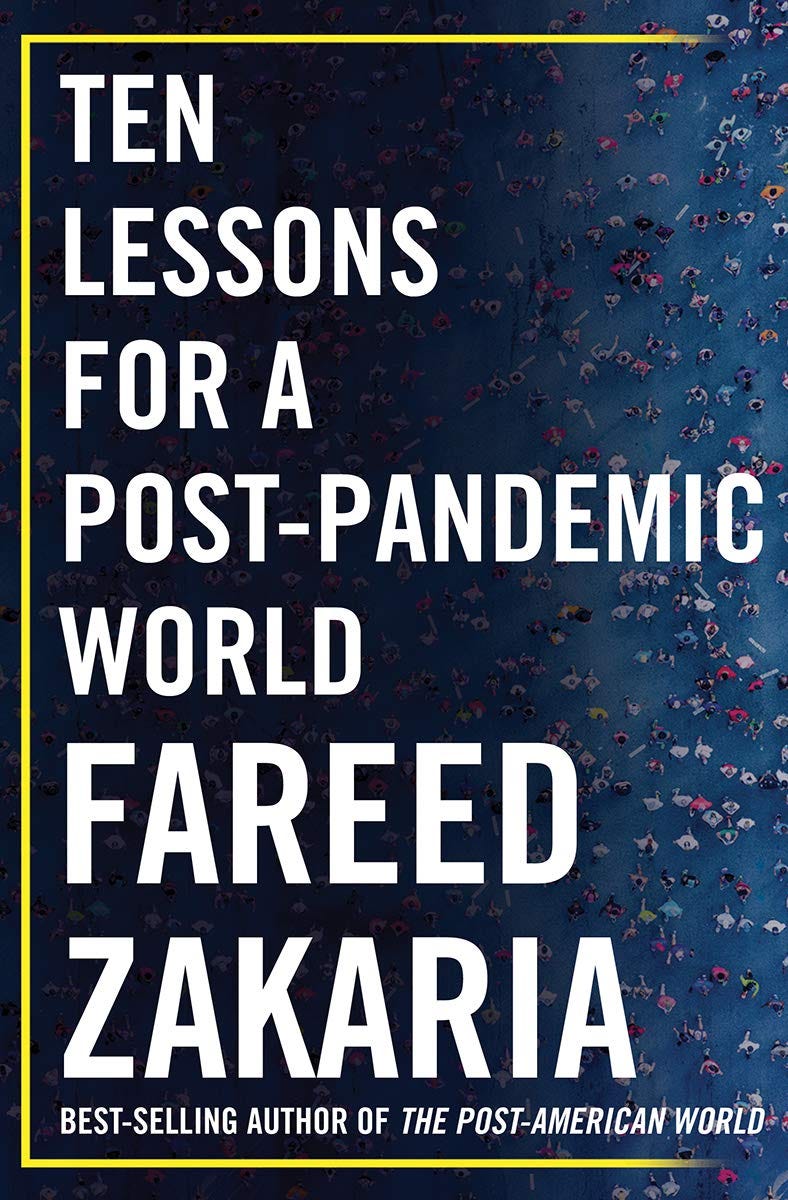2021 was better for five whole days, then came January 6th
FWIW is back. New year, old issues and not so good outlook.
👋 Welcome to the FWIW by David Tvrdon, your weekly tech, media & audio digest.
🌐 Online version. 👉 Be sure to subscribe, if you were sent this newsletter.
In this edition
🤔 How 2021 started
🤳 2021 will good for subscription-based businesses
💬 Other tech, media, audio & podcasting news
I was planning on sending out an end-of-year issue last week, unfortunately, had to tend to some family matters (Covid-19 related).
Introduction to 2021, could have been better
📸 by Cameron Smith on Unsplash
Today’s edition is coming in late because instead of writing and putting together this issue I spent several hours watching US cable news and scrolling Twitter simultaneously.


During the last two weeks, I have seen many saying that they are really looking forward to 2021, that “we need a change” and 2021 will somehow be different. I joined that train a few months back as well. I guess it was a coping mechanism for 2020.
2021 will not be different. As the events of January 6th confirmed, we still have Trump in 2021, Covid-19 is still raging, social media does not have things under control (although there are some signs of normalcy).
Although, if you like to stick to facts, The Economist has a traditionally good “World in 2021” series online.
For example, book sales were really good in 2020 and the outlook for 2021 is even better, move away from offices to home offices or temporary offices will continue, we should have the postponed Olympics and many events like the Oscars will likely still be online only.
So actually, in some regards, 2021 will be different than 2020. One thing, though, will be unchanged - getting FWIW by me every Thursday.
🙏 Liked it so far? ❤️ Support this newsletter by sharing it, thanks!
In other news
TECH
🤳 2021 will be another good year for digital subscription-based services. Cameo (which lets fans pay for personalized videos from celebrities) was one of the apps that did particularly well in 2020 and will do possibly even better in 2021. The company brought in ~ $100 million, sold together 1.3 million videos, and doubled its employee base. Here is a good interview with the CEO from last year on NYT’s Sway podcast. Also, Cameo hired a bunch of new executives from Instagram, Reddit, Quibi, LinkedIn, McDonald’s. [Axios]
👓 Facebook will bring its smart glasses “sooner than later this year”. No AR yet, this is a kind of the first iteration and we are expecting something along the lines of Snapchat’s Spectacles or Amazon’s Echo Frames (which according to the review are not bad, though have some issues). Also, did you know that Facebook’s VR, AR, and hardware teams account for around 6,000 employees? That's huge, according to Kurt Wagner that’s larger than IG and WA teams and a sign of how much FB is pushing in this area. [Bloomberg]
💰 EU wants to seriously kick-start European startups with a new fund. This is actually huge news, the EU will become a shareholder in startups for the first time. The Union tried different approaches before but this time it came up with a scheme of investing directly with up to 15 mil. € into several European startups. [Bloomberg]
It will combine grants and equity stakes to finance early-stage companies in so-called deep tech, such as health, sustainability and advanced manufacturing. Ownership will range between 10% and 25% of a company, with ticket sizes as much as 15 million euros, the EU said.
🚗 In Norway, electric cars accounted for more than half of all cars sold. The year before it was 42%, still huge, last year’s 54% means the country is an absolute leader in killing off the internal combustion engine. There was one significant change: Audi E-Tron overtook Tesla Model 3 as Norway's top-selling car. [CNN]
Don’t be sad for Elon, he has just surpassed Jeff Bezos as the world’s richest person. I think he will get over this Norway situation. [Bloomberg]
🤖 OpenAI introduces two new GPT-3 models. CLIP classifies images into categories from arbitrary text, and DALL·E generates images from text. DALL·E is especially intriguing (look at the image below). After the text, OpenAI and GPT-3 tackle images next in a quest to build an AI model that can interact with humans without giving prompts as if for a computer. [MIT Technology Review]
📡 Here is what could happen with Covid-19 contact tracing data. Journalist Kirsten Han reported that TraceTogether, Singapore’s Bluetooth-enabled contact tracing system, data can be accessed by the police for their investigations. At first, it was advertised as purely being used only for contact tracing. [We, the citizens]
📙 Apple Books has over 90 million monthly active users. The information was buried in the latest press release. Honestly, I thought not many people are using the service but 90 mil. is not bad. [9to5Mac]
📲 New Samsung flagship phones are coming. Galaxy Unpacked event will be held on January 14, where it's expected to unveil the Galaxy S21, S21 Plus, and S21 Ultra. [The Verge]
📅 Top tech trends of 2021. Fast Company asked more than 30 experts to weigh in and predict what the future holds for technology in 2021. [Fast Company]
MEDIA
📊 New report: Journalism, media, and technology trends and predictions 2021. I will have a summary up tomorrow at The Fix, look out for that. [Reuters Institute for the Study of Journalism]
📩 Here’s a 39 min. read on Substack on The New Yorker. It’s a good read in both cases whether you follow news about Substack or not. [The New Yorker]
✍️ Why are publishers calling newsletter writers “hosts” and “anchors” now? Asks NiemanLab and there is no bad answer: hosts and anchors have worked for TV for decades, the same goes for radios. Having a personality for a news product is tricky but seems to be working when you look for example on the daily news podcasts. [NiemanLab]
✋ It’s time to deplatform Trump, writes Casey Newton. At the time of writing this: Facebook, Instagram, Twitch, Snapchat, even Shopify took down two online stores affiliated with the president. [The Verge]
Some other stories via Tweets:




AUDIO & PODCASTING
🎧 Twitter acquired Breaker staff to help with Twitter Spaces. Twitter Spaces is Twitter’s new audio-based networking project (think something in the lines of Clubhouse). [TechCrunch]
😞 Caliphate-gate. Turned out that the super popular and multi-awarded podcast The Caliphate by the New York Times was built on stories by a fabulist, in other words - the main source of the story lied. The NY Times went on a mea culpa tour, including editor in chief Dean Baquet. Unfortunately, it seems that the main characters responsible remain largely unpunished. [HotPod News]


🤦♂️ Amazon marked free podcasts as costing $8.95 with a discount for Audible subscribers. [The Verge]
📈 Even though the number of people commuting has plummeted this year, audiobook revenue was up more than 17 percent over the same period in 2019. Yes, 2020 wasn’t just surprising good for books but also for audiobooks. [NY Times]
🔪 Will Clubhouse Kill Podcasting? Tom Webster, the Senior Vice President at Edison Research, wonders how Clubhouse and similar audio drop-in apps might change the podcasting ecosystem. Live radio is still popular, consider Clubhouse an updated digital version of that for a younger generation. [Tom Webster]
OTHER
😂 One of the funniest headlines this week: Apparently, The CIA Is Rebranding As A Millennial Start-Up. [Yahoo]
BOOK RECOMMENDATION
📚 Fareed Zakaria: Ten Lessons for a Post-Pandemic World [Amazon, Martinus.sk]
I finished this book very quickly and will come back to it a few times in 2021.
And 100% agree with this assessment from the NY Times review of the book: Read “Ten Lessons.” It is an intelligent, learned, and judicious guide for a world already in the making. (Zakaria was a guest on the recent episode of the Book Review podcast)
Catch me on Twitter or LinkedIn. Was this forwarded to you? 👉 Subscribe over here.








